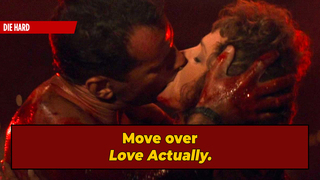Is 'Die Hard' Actually A Rom-Com

Is Die Hard a Christmas Movie? It's a question we've seemingly been debating for centuries. In fact, Historians point to the first recorded instances of "Is Die Hard A Christmas Movie" discourse back in the bible when Jesus took the cross and said, "Someday they'll make a movie about this, and they'll call that movie Die Hard." But still, some will question the legitimacy of the text (the translation from Latin is always messy), once again putting us back at square one.
The answer is a big "Yeah, no duh, Die Hard is a Christmas movie," but rather than rehash old questions that no one should give a shit about anymore, I'd like to pose a new question that no one should give a shit about anymore. That question: Is Die Hard is a romantic comedy?
I know what some of you might be thinking: "Die Hard can't be a rom-com! Rom-coms are about ha-has and smoochy-smoochies. Die Hard's about running barefoot through an office building and yelling 'Yippee-ki-yay, motherfucker' while shooting international terrorists with a machine gun. Die Hard's an action movie! It's THE action movie." All of this is true, but I ask you, why can't it be both? See, Die Hard follows the structure of a rom-com down to a 'tee.' (Or, in the case of John McClane, down to a bloodied, torn-up muscle shirt.)
Don't Miss
Let's look at the story beats for Die Hard. John McClane is flying to Los Angeles to reconcile with his wife, Holly. Already you have the motivation, and it's a romantic one. John then arrives at Holly's Christmas party, and immediately he's a fish out of water. Holly has become a high-ranking executive at a major international corporation. In contrast, John is a blue-collar, NYC cop who is so unfamiliar with Holly's world that he sits in the front seat when he's picked up in a limo. Their lives (especially career goals) and their visions for the future have become so far apart that they can no longer coexist, and therein lies our obstacle. That obstacle causes a falling out when John learns Holly isn't using his last name and, hot head that he is gets super pissed about it.
You get the sense that divorce is on the table, but right before they can get into any enthralling discussions about alimony laws, Hans Gruber shows up and takes Holly and her coworkers hostage. Now we're at the major conflict. John can choose to escape, or he can literally fight for his marriage. Of course, he chooses to stay, thus beginning his journey. John then thwarts Gruber's heist, saves Holly's life, and, in the process, realizes he has to change as a man.
John's message to his wife isn't that he loves her. It's that he's sorry. There's his character growth and by the end of the movie, both he and Holly realize that while they might not perfectly conform to each other's lives, they're willing to work it out. (Also, that they don't mind kissing with a mouth full of debris and German-terrorist-blood.)
Compare that to the story beats in the rom-comiest of Christmas rom-com's, Love Actually. Let's look at the Hugh Grant plotline. David, Hugh Grant's character, is the newly elected Prime Minister of England, and he's immediately smitten with Natalie, an assistant in his household staff. (Romantic motivation) He wants to pursue a relationship with her, but he doesn't know how to because of their variances in status and his worries over the public's perception. (Bam, obstacle, and look at that, it's based on their career.) That obstacle is then compounded when U.S. President Billy Bob Thornton pulls a Billy Bob Clinton and hits on Natalie, hard.
David is outraged and nearly turns this into an international incident before realizing his love for Natalie interferes with his duty as Prime Minister, so he reassigns her. (The falling out) This makes David miserable, however, and after some soul-searching and a card from Natalie spurring him to action, he goes door to door in a search to win her back (journey) that ultimately leads to their relationship becoming public knowledge. That's okay, though, because he's now cool with taking the heat of British tabloids or possible nuclear war with an enraged Billy Bob if it means having Natalie by his side. (Character growth).
You've got a character that overcomes obstacles on a quest for love and then changes in the end to achieve it. It doesn't matter if your big romantic gesture is door-to-door caroling or blowing up an elevator shaft with C4. It's all the same shit! There are, of course, a few differences in structure that make Die Hard not a typical rom-com. Die Hard, for example, is about an existing marriage rather than a newfound romance. But plenty of rom-coms, like On The Rocks and Crazy, Stupid, Love deal with rekindling the flame of an existing marriage. We also don't get a meet-cute, but again, why would we? This couple was already together. Everything else that makes a rom-com a rom-com is all there.
There's the creepy, rich, corporate dude who's doing too much coke and hitting on your wife in Harry Ellis.
There are the hilarious side-kicks that support the main character on his quest for love in Al Powell and Argyle. (Tell me this character wouldn't be right at home in an Apatow movie).
And, it's even funny! (That's the 'com' part)
It's all there. If Die Hard can be a Christmas movie, then I'd think it can certainly be a rom-com. I mean, goddamn, we let Good Luck Chuck be a rom-com, and that isn't funny or romantic. But, I guess we'll leave this question to the internet historians to decide.
Support Dan on Twitter and he will talk about his life with you in lieu of getting a therapist.
Top Image: 20th Century Studios